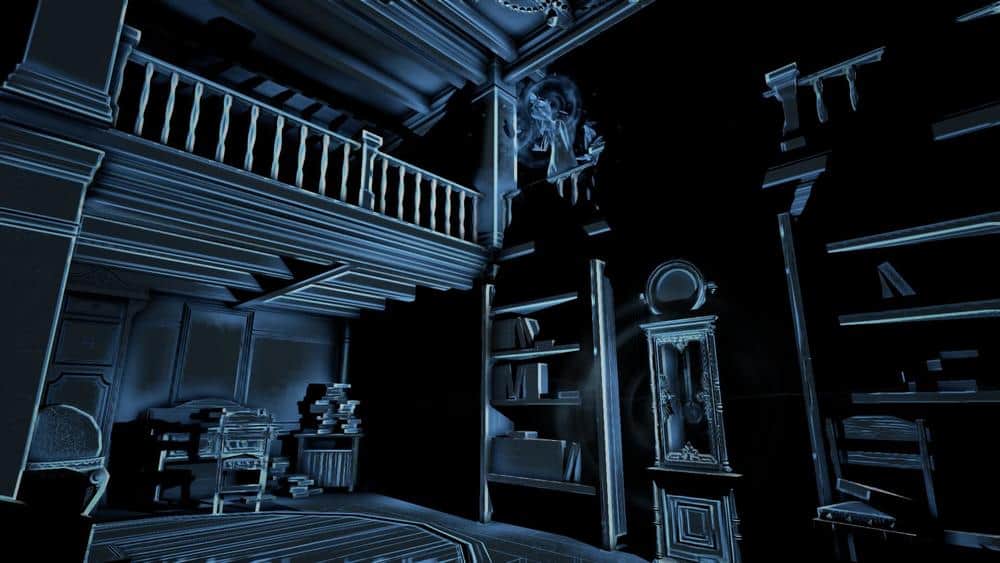Video Gamer is reader-supported. When you buy through links on our site, we may earn an affiliate commission. Prices subject to change. Learn more
Cassie, the protagonist of Perception, deals with things remarkably well. Most people, if they were were pursued by a vengeful spirit, trapped in a haunted house that kept changing its layout, and only able to ‘see’ their environment by using echo-location tapping, would do much less wisecracking than Cassie manages.
Cassie’s whole thing is being independant and not needing help, as you learn through phone calls with her boyfriend, which get to the point where he actually tells her it’s okay to ask for help. Cassie’s fierce drive to do everything for herself is tied in to her blindness, which, wouldn’t you know it, is also key to the central mechanic for the game. Cassie, exploring a creepy abandoned house that she’s been dreaming about, but turns out to be real, taps her cane and uses the sound to build a picture of her surroundings. It blossoms out of the darkness and fades away again as the sound dies.
It sort of makes sense that Cassie is less frightened than you are; it is, after all, how she lives life normally. She makes use of functions on her phone like text-to-speech, or an app that connects her to a volunteer who’ll describe photos she sends (and something similar exists in real life). It’s introduced without being jarring, and all makes sense together.
It’s what Perception uses to mark itself out from the the ever-mushrooming cloud of scary games these days — many of which use the phrase ‘psychological horror’ in their blurbs, and are set in a disused asylum or hospital — and it works. It’s like walking through a wireframe or a blueprint. Cassie’s footsteps create little blooms of context, and hissing radiators and televisions make flickering patches in the otherwise unknown house.
/https://oimg.videogamer.com/images/22f7/ceb234de-7350-4123-a522-8727cbc4c712_Perception-2.jpg)
Unfortunately, the surreal beauty of the game isn’t entirely backed up by its content. Cassie unravels four different, tragic stories that took place at different time periods in the house (and the house changes its layout over the years, which is a nice, disorientating touch). She’s occasionally hunted by the Presence, a wraith-like figure that repeats snatches of dialogue from other characters. It appears if Cassie makes too much noise, but in my playthrough that was almost never. It’s a shame, because in the scripted events featuring the Presence it’s extremely creepy, parroting ‘I will find you!’ in a jumble of other people’s voices.
Because of this, you’re absent a real sense of tension for a lot of the game, and long sections dissolve into being a slow walk around a vaguely creepy house. There are other parts of Perception that aim at scary and miss: at one point you run into some dolls on rails that start firing guns at you, which ends up being annoying and slightly absurdly funny. The dolls are much more frightening when they’re staring, or you think they’ve moved when you weren’t watching.
The dolls only feature in one of the four stories Cassie encounters, all inevitably tragic, and during which the house becomes mixed with chunks of wartime France, or full of half-finished animatronics, or a bit on fire, depending on what happened at the time. There’s one instance of the house delving into Cassie’s own life, but it never really happens again. It feels like the developers at The Deep End Games weren’t able to include as much as they wanted. Even the story of the house, which builds to a crescendo, ends on a slightly cut off note.
/https://oimg.videogamer.com/images/4d4d/b97f0b5b-2591-4efc-8cd0-b2f06ae7ff1e_Perception-1.jpg)
Developer: The Deep End Games
Publisher: Feardemic
Available on: PlayStation 4 [reviewed on], Xbox One, PC
Release date: June 6 2017 (February 30 for PC)
